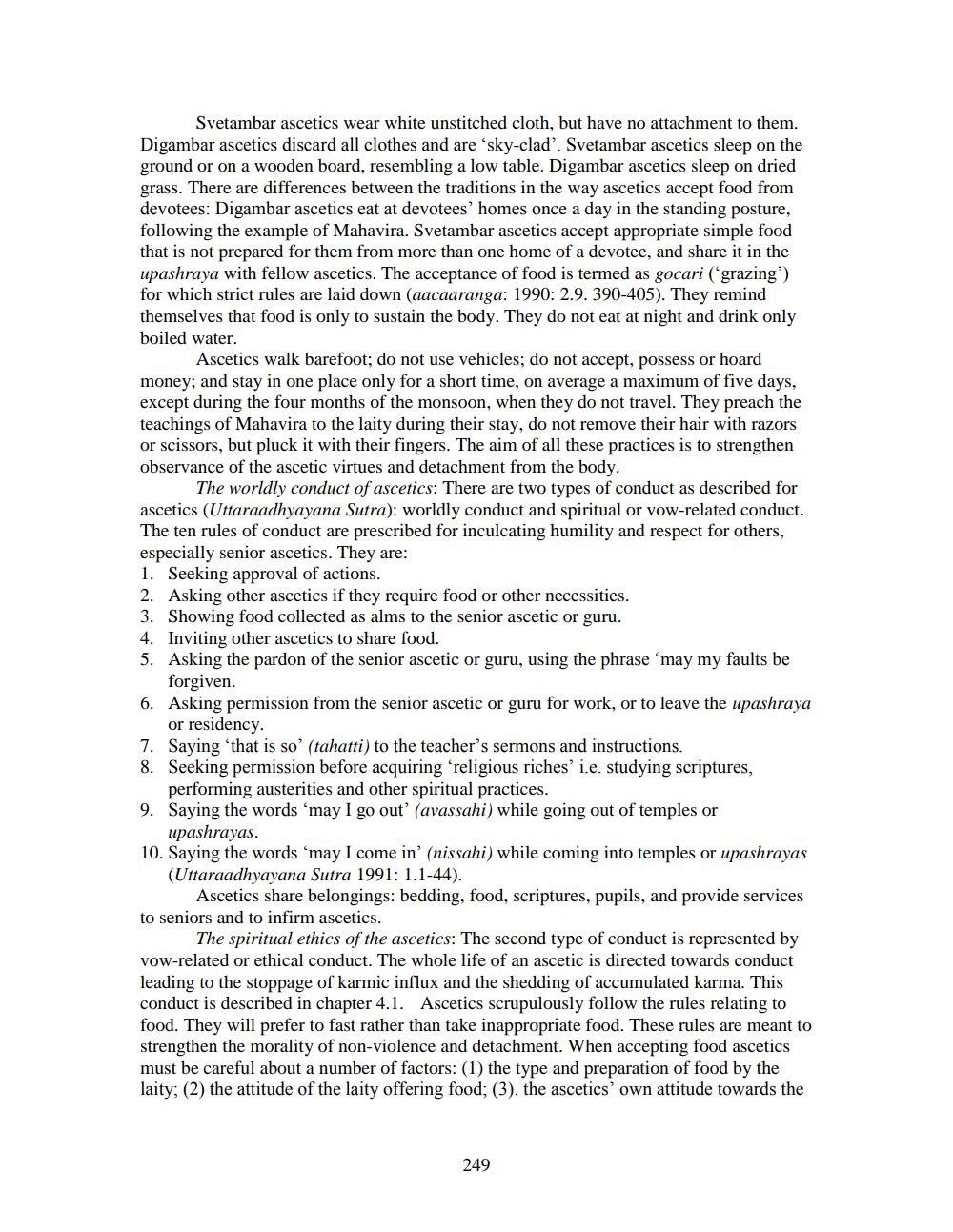________________
Svetambar ascetics wear white unstitched cloth, but have no attachment to them. Digambar ascetics discard all clothes and are 'sky-clad'. Svetambar ascetics sleep on the ground or on a wooden board, resembling a low table. Digambar ascetics sleep on dried grass. There are differences between the traditions in the way ascetics accept food from devotees: Digambar ascetics eat at devotees' homes once a day in the standing posture, following the example of Mahavira. Svetambar ascetics accept appropriate simple food that is not prepared for them from more than one home of a devotee, and share it in the upashraya with fellow ascetics. The acceptance of food is termed as gocari ("grazing') for which strict rules are laid down (aacaaranga: 1990: 2.9. 390-405). They remind themselves that food is only to sustain the body. They do not eat at night and drink only boiled water.
Ascetics walk barefoot; do not use vehicles; do not accept, possess or hoard money, and stay in one place only for a short time, on average a maximum of five days, except during the four months of the monsoon, when they do not travel. They preach the teachings of Mahavira to the laity during their stay, do not remove their hair with razors or scissors, but pluck it with their fingers. The aim of all these practices is to strengthen observance of the ascetic virtues and detachment from the body.
The worldly conduct of ascetics: There are two types of conduct as described for ascetics (Uttaraadhyayana Sutra): worldly conduct and spiritual or vow-related conduct. The ten rules of conduct are prescribed for inculcating humility and respect for others, especially senior ascetics. They are: 1. Seeking approval of actions. 2. Asking other ascetics if they require food or other necessities. 3. Showing food collected as alms to the senior ascetic or guru. 4. Inviting other ascetics to share food. 5. Asking the pardon of the senior ascetic or guru, using the phrase 'may my faults be
forgiven. 6. Asking permission from the senior ascetic or guru for work, or to leave the upashraya
or residency. 7. Saying that is so' (tahatti) to the teacher's sermons and instructions. 8. Seeking permission before acquiring 'religious riches' i.e. studying scriptures,
performing austerities and other spiritual practices. 9. Saying the words 'may I go out' (avassahi) while going out of temples or
upashrayas. 10. Saying the words 'may I come in (nissahi) while coming into temples or upashrayas (Uttaraadhyayana Sutra 1991: 1.1-44).
Ascetics share belongings: bedding, food, scriptures, pupils, and provide services to seniors and to infirm ascetics.
The spiritual ethics of the ascetics: The second type of conduct is represented by vow-related or ethical conduct. The whole life of an ascetic is directed towards conduct leading to the stoppage of karmic influx and the shedding of accumulated karma. This conduct is described in chapter 4.1. Ascetics scrupulously follow the rules relating to food. They will prefer to fast rather than take inappropriate food. These rules are meant to strengthen the morality of non-violence and detachment. When accepting food ascetics must be careful about a number of factors: (1) the type and preparation of food by the laity; (2) the attitude of the laity offering food; (3). the ascetics' own attitude towards the
249




